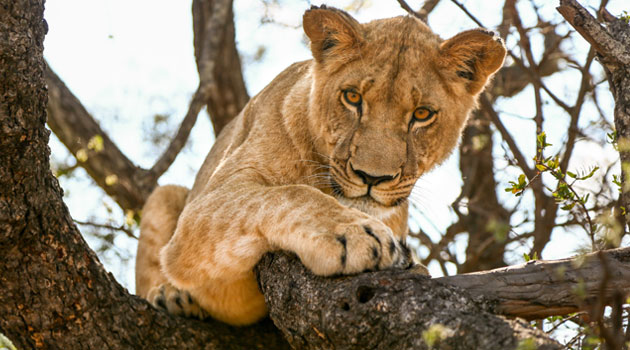
“The public is urged to be vigilant and cautious about unconfirmed lion sighting in Karen, Nairobi. Please report to us,” the officers appealed/FILE
NAIROBI, Kenya, Apr 12 – The search for the stray lion that was spotted in Nairobi’s Karen area was not fruitful with KWS officers suspecting that it could have gone back to the park.
A team of armed Kenya Wildlife Officers led the search within the leafy suburbs leaving nothing to chance, “in order to avoid any human loss or injury.”
“The public is urged to be vigilant and cautious about unconfirmed lion sighting in Karen, Nairobi. Please report to us,” the officers appealed.
Kenya Wildlife Service rangers were patrolling the area around Maasai Lane in Hardy where residents reported seeing the big cat on Tuesday night.
The sighting comes barely two weeks after the killing of another lion named Mohawk.
Residents in the area have been warned to be alert and exercise caution to avoid provoking it.
“We appeal to public to report any sighting of a lion in Hardy area of Karen, Nairobi,” the service appealed through their Twitter handle.
One of the officers leading the search said, “It was unlikely that the lion is still here.”
Since February the king of the jungle’ has been sighted in the Kenyan capital several times causing human injuries in some incidences.
In mid-February, two lions spent a day wandering through Kibera, a densely-packed city slum, before returning to the park, and days later more lions were spotted in town.
The big cats are under growing pressure as one of Africa’s fastest growing cities expands onto ancient migration routes and hunting grounds, with conservationists and wildlife experts explaining that it is the people who have moved into the lions’ home ranges.
Lions are estimated to have declined in number by as much as three-quarters since 1980, and to occupy less than a tenth of their historic range across Africa.
The survival of carnivore populations in Kenya is severely threatened by habitat loss and anthropogenic activity, reduction in wild prey base, human-carnivore conflicts, disease, ignorance and misconceptions, road accidents and poorly managed tourism.
These species are threatened directly when they are killed due to threats on human beings and livestock.
Conservationists say wildlife protection is a low priority for city officials struggling with multiple challenges in a grossly unequal capital of some 3.5 million people with overstretched basic services and infrastructure.









































